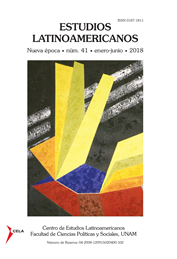Visiones de lo negro en la escritura caribeña: de James y Lamming a Césaire y Fanon
Contenido principal del artículo
Resumen
Se reflexiona sobre los modos en que cuatro autores importantes rebaten las visiones esencialistas de la identidad negra antillana. La base es el análisis textual de un conjunto de obras teóricas y de ficción con miras a identificar dinámicas contradiscursivas que desde la academia y el campo literario redefinen el legado social y cultural de las comunidades negro-caribeñas. Este artículo contribuye a los estudios sobre el Caribe en la medida en que analiza un corpus escritural vital para el pensamiento histórico en torno a la región.
Descargas
Detalles del artículo
Citas en Dimensions Service
Citas
Bibliografía
BHABHA, Homi (2002), El lugar de la cultura, Buenos Aires, Manantial.
BRATHWAITE, Edward Kamau (1984), History of the Voice: Development of Nation Language in Anglophone Caribbean Poetry, London, New Beacon Books.
CÉSAIRE, Aimé (1969), Cuaderno de un retorno al país natal, México, Ediciones Era, edición bilingüe, prólogo y traducción de Agustí Bartra.
CÉSAIRE, Aimé (2006a), Discurso sobre el colonialismo, Madrid, Akal.
CÉSAIRE, Aimé (2006b), “Discurso sobre la negritud. Negritud, etnicidad y culturas afroamericanas”, en Aimé CÉSAIRE, Discurso sobre el colonialismo, Madrid, Akal.
COLLINS, Merle (2011), “La lección”, en Keith ELLIS (compilador), Poetas del Caribe anglófono, La Habana, Casa de las Américas.
DUBOIS, Laurent (2004), A Colony of Citizens: Revolution and Slave Emancipation in the French Caribbean, 1787-1804, Chapel Hill, The University of North Carolina Press.
FANON, Frantz (1973), Los condenados de la tierra, México, Fondo de Cultura Económica.
FANON, Frantz (1993), “Antillanos y africanos”, en Leopoldo ZEA (coordinador), Fuentes de la cultura latinoamericana, México, Fondo de Cultura Económica.
GILROY, Paul (1993), The Black Atlantic: Modernity and Double Consciousness, London, Verso.
JAMES, Cyril Lionel Robert (1997), Minty Alley, Mississippi, University of Mississippi Press.
JAMES, Cyril Lionel Robert (2010), Los Jacobinos Negros: Toussaint Louverture y la revolución de Saint-Domingue, La Habana, Casa de las Américas.
LAMMING, George (1979), En el castillo de mi piel, La Habana, Casa de las Américas.
LAMMING, George (2010), Los placeres del exilio, La Habana, Casa de las Américas.
PAGET, Henry (2000), Caliban’s Reason. Introducing Afro-Caribbean Philosophy, New York, Routledge.
TROUILLOT, Michel Rolph (1995), Silencing the past. Power and the production of history, Boston, Beacon Press.
WALSH, John Patrick (2013), Free and French in the Caribbean: Toussaint Louverture, Aimé Césaire, and Narratives of Loyal Opposition, Bloomington, Indiana University Press.
WAMBU, Onyekachi (2011), “Black British Literature since Windrush”, en BBC History, British History. Dirección URL <http://www.bbc.co.uk/history/british
/modern/literature_01.shtml>.

Este obra está bajo una licencia de Creative Commons Reconocimiento-NoComercial-SinObraDerivada 4.0 Internacional.

